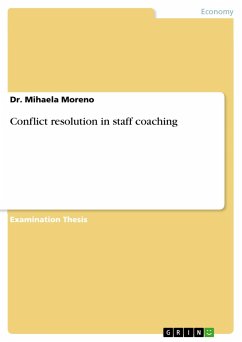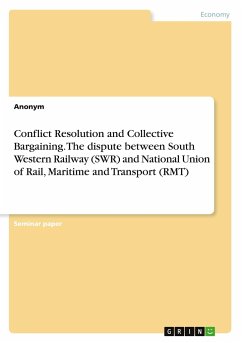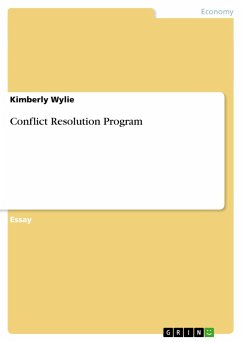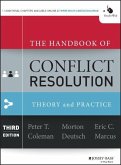Examination Thesis from the year 2013 in the subject Leadership and Human Resource Management - Miscellaneous, grade: 1,3, German Academy for Management Berlin, language: English, abstract: This work shows that conflicts should not always have a negative connotation since they might be necessary for a productive work in a team and for our personal development. However, conflicts can be beneficial for us and for our relations only if we are able to overcome them through professional communication and social competence. In this thesis, I show on the basis of Watzlawich's (1964) and Schulz von Thun's (2003) theoretical models of communication that conflicts should not be neglected or ignored but rather they should be thoroughly analyzed and solved in a well-prepared conflict discussion. The (conflict) discussion is regarded as a modern tool of human resources management and is crucial in contemporary conflict resolution (cf. Ramsbotham, Woodhouse & Miall 2011). The paper contains a theoretical part where the concept of conflict and a model of communication are presented and an empirical part where I present a situation of conflict at work and how this situation could be solved. The work is structured as follows:In chapter 2 I define what a conflict is in the light of Buridan's ass concept and I classify conflicts in terms of Watzlawick (1964). Moreover, this chapter also shows that conflicts are not only trouble-makers but they are necessary for a personal and professional development. Chapter 3 presents the well-known model of communication proposed by Schultz von Thun (2003, 2006) and possible communicative disorders.Chapter 4 defines what staff coaching is and which types of employee-employer discussions are recurrent in the practice. Then, based on Neuberger (2004), I will regard several instruments of staff coaching such as active listening, questioning techniques and feedback.Chapter 5 regards an empirical study of a conflict resolution that takes intoaccount all the ingredients illustrated so far by the theoretical models. The main purpose of this chapter is to show how an employee-employer talk known in the personal management literature as staff coaching should be prepared and conducted by regarding the theoretical communicative models previously presented. Chapter 6 concludes the work with a personal opinion about conflicts and their resolution.








